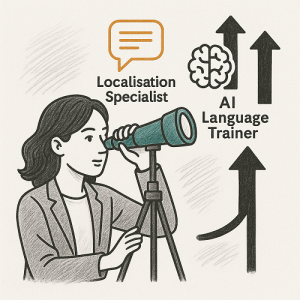Just a decade ago, roles like “Social Media Manager” or “Data Scientist” were novelties. Today, they are indispensable. We are now witnessing a similar evolution in the realm of language, driven by the dual forces of hyper-globalization and the artificial intelligence revolution. The demand for language expertise is expanding far beyond traditional translation and interpretation into new, highly strategic roles that sit at the intersection of language, technology, and business growth.
Meet the new language professionals. They aren’t just bilingual; they are linguistic strategists, cultural translators, and AI educators. Let’s explore two of the most significant emerging roles that are reshaping the talent landscape: the Localization Specialist and the AI Language Trainer.
Beyond translation: the rise of the localization specialist
In a competitive global market, simply translating your website is no longer enough. True connection with a new audience requires localization — the comprehensive process of adapting a product, service, or content to the specific cultural, linguistic, and functional expectations of a target market. This is the domain of the Localization Specialist.
A localization specialist is a master project manager and cultural consultant. Their work goes far beyond words, involving:
- Cultural adaptation: ensuring that images, colours, symbols, and layouts are culturally appropriate and resonant.
- Functional nuances: adapting formats for dates, times, currencies, and units of measurement.
- Linguistic subtlety: managing the translation of everything from UI/UX copy to marketing campaigns and legal disclaimers, ensuring the tone and style are perfect for the local audience.
- Cross-functional collaboration: acting as the central hub between marketing teams, software developers, legal experts, and regional sales teams to ensure a seamless and authentic local experience.
Why the role is exploding: the shift from a “one-size-fits-all” to a “local-first” business strategy. Companies now understand that deep market penetration and customer loyalty are built on authentic cultural and linguistic connection.
Teaching the machines: the emergence of the AI language trainer
The recent explosion in generative and conversational AI has created a massive, unforeseen need for human language experts to teach, refine, and police the models. An AI can process billions of words, but it needs a human guide to truly understand nuance, context, and appropriateness. This is the job of the AI Language Trainer (also known as a Linguistic Annotator or AI Content Reviewer).
An AI language trainer is part-linguist, part-teacher, and part-data analyst. Their primary goal is to make AI communication more accurate, natural, and safe. Their tasks include:
- Model training: creating high-quality, structured datasets and examples to train AI on specific linguistic tasks.
- Quality control: reviewing AI-generated responses to identify errors in grammar, tone, style, and factual accuracy.
- Nuance and bias correction: “teaching” the AI the subtleties of human language—like sarcasm, idioms, and cultural references—while actively working to identify and eliminate harmful biases in its responses.
- Collaboration with engineers: providing critical linguistic feedback to data scientists and AI engineers to improve the underlying algorithms.
Why the role is surging: every company deploying a customer-facing chatbot, developing a large language model (LLM), or using AI for content creation needs experts to ensure the technology is effective and doesn’t create reputational risks.
What this means for HR and talent acquisition
The rise of these roles has profound implications for how we think about and assess language skills:
- Proficiency is the starting point, not the end goal: for these positions, being bilingual is merely the entry ticket. The real value lies in a candidate’s analytical ability to deconstruct language, understand cultural context, and apply that knowledge strategically.
- A new blend of hybrid skills: the ideal candidates possess a unique combination of deep linguistic mastery, cultural intuition, project management acumen, and a degree of technical savvy.
- The assessment challenge: a simple conversational interview cannot reliably identify the high-level analytical and linguistic skills required for these roles. How do you test a candidate’s ability to spot subtle cultural insensitivities or explain a complex grammatical rule to an AI model?
Hiring for the future of language
The job market for language professionals is transforming. The future belongs to those who can bridge the gap between human communication and the strategic demands of technology and global business. For companies, this means rethinking how you recruit for language-dependent roles. Your success in hiring top-tier Localization Specialists and AI Language Trainers will depend on your ability to look beyond self-reported fluency and accurately assess a candidate’s deep, analytical command of language.
Are you equipped to identify the elite language talent needed for the jobs of tomorrow?
Hiring for cutting-edge roles like Localization Specialist or AI Language Trainer requires an assessment process that goes beyond conversational fluency. You need to verify a candidate’s foundational mastery and analytical understanding of language. Focus Audit Tool provides in-depth, expert language assessments that can reveal the nuanced skills necessary to excel in these critical, emerging positions.






